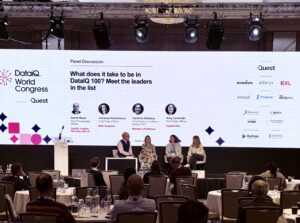The CEO’s Lens: Unlocking Business Transformation Through the Chief Data Officer
Speaker: Matt Prebble, Accenture United Kingdom, Ireland & Africa
The morning opened with a CEO’s perspective on data leadership as an engine of agency, challenging delegates to see the CDO as the CEO’s execution multiplier: a role that converts insight into organisational intent.
Key insights:
- From agents to agency. True progress depends on the organisation’s capacity to act, not simply on the intelligence of its models.
- Alignment over architecture. Incentives and KPIs must tie directly to data outcomes.
- Integration as product discipline. The path from proof-of-concept to profit lies in mastering integration across legacy systems, people, and process.
- Centres of execution, not excellence. Data functions must evolve from advisory units to delivery engines that embed measurable value.
- Trust as growth capital. Sustained transparency and ethical accountability are the foundations of every agentic enterprise.
Driving AI Value with a Product Mindset
Speaker: Dan Taffler, formerly Reach PLC
Cutting through the noise around generative AI, Taffler demonstrated how a product mindset transforms AI from experiment to enterprise muscle.
Key insights:
- Product, not pilot. Embed AI within a product framework that focuses on user value and iterative delivery.
- Human-centred acceleration. In publishing, automating tasks like metadata tagging and SEO freed journalists for creativity led to a reduction in publication time by a staggering 2,000%.
- Delivery capability is strategic. Building in-house MVP and prototyping capacity breaks dependence on slow enterprise-IT cycles.
- Continuous value drops. Frequent, visible wins sustain confidence and investment through hype cycles.
Data and AI Leadership: Under Way and Under Pressure
Speaker: David Reed, Chief Knowledge Officer – DataIQ
Drawing on fresh findings from DataIQ’s 2025 leadership report, David Reed mapped how leaders are responding to an environment where expectation outpaces readiness.
Key insights:
- FOMO (Fear of Maxxing Out). Organisations are moving at pace, using velocity to accelerate efforts to deploy AI at scale – but must move forward with consideration.
- Three modes of leadership. CDOs are operating in one of three states depending on the balance of mandate, momentum and means: Orientation, Scaling or North Star. Each mode demands a different set of leadership tasks and priorities.
- As headcount grows, operating models must evolve. While smaller data offices can depend on informal structures to gain influence and build trust, data offices with a headcount over 150 need structure to bring coherence and embed guardrails to avoid the “messy middle” as they scale.
- Framework for reflection. The model provides CDOs a diagnostic lens for assessing maturity and defining next steps in execution.
Building Trust to Enhance the Role of Data in the Economy
Speaker: James Benford, Director General – Economic, Social and Environmental Statistics, Office for National Statistics (ONS)
The closing keynote widened the lens from enterprise to national infrastructure. The ONS’s transformation agenda was used as a live example of how transparency, cultural renewal, and digital investment can rebuild trust in public data.
Key insights:
- Trust as economic capital. Data curation now represents up to £120 billion of UK economic activity; credibility underpins the entire data economy.
- Quality over quantity. A leadership reset and new mission statement to refocus ONS outputs on reliability and independence, not volume, are proving successful.
- Digital modernisation. Unified data-to-publication workflows and AI-enabled automation are cutting costs and improving accuracy.
- Culture of transparency. “Space for excellence” and “working in the open” are guiding principles for rebuilding internal confidence and public trust.
- Collaboration as a team sport. Re-establishing partnerships with business, academia and citizens is key to a trusted national data ecosystem.
Knowledge Exchange Roundtables
Beyond the main-stage sessions, more than two dozen closed-door Knowledge Exchange Roundtables gave senior data and AI leaders the space to test strategies, share lessons, and confront the issues shaping their 2026 agendas.
Two discussions captured the current pulse of enterprise transformation: how to build literacy that lasts, and how to unlock value from assets already in hand.
The roundtable focusing on data literacy and creating a data-driven culture provided incredible insights into how a diverse range of organisations of different maturities are tackling one of the most persistent challenges: turning “data literacy” from a training programme into a cultural norm.
Key insights:
- From literacy to confidence. True maturity comes when employees feel empowered to question data quality and context, not just consume dashboards.
- Accountability for truth. Each critical KPI needs a single owner and verified lineage to prevent conflicting narratives.
- Culture over compliance. Training must be reinforced through recognition, performance measures and everyday decision-making.
- Safe spaces to learn. Forums and communities where staff can ask questions freely accelerate adoption and normalise help-seeking.
- Language matters. “Data confidence” resonated more positively than “literacy,” signalling empowerment rather than deficit.
The group agreed that a data-driven culture is measured not by dashboards delivered, but by the curiosity and critical thinking people apply when leaders aren’t in the room.
“Data culture is how you use data when a data leader isn’t in the room.”
A different roundtable examined creating incremental value from existing assets. The participants reflected a widespread pivot across industries, from building capability to extracting measurable value.
Key insights:
- From build to payback. After a decade of infrastructure investment, leaders are under pressure to demonstrate tangible ROI and shift from enablement to monetisation.
- People over platforms. Organisational politics and process inertia now outweigh technical barriers. Successful delivery depends on shared ownership and clear accountability between data, business, and IT.
- Quick wins, real momentum. High-impact automations, such as document summarisation or customer-support triage, are proving ideal “value accelerators” that earn credibility and further funding.
- Balanced governance. Over-zealous compliance stifles value; mature governance educates rather than restricts, aligning risk appetite with opportunity.
Across every conversation, the message was clear: unlocking value is now as cultural as it is technical. Sustainable success for data and AI teams depends on connection, collaboration, and accountability between business and data leaders alike.
By bringing CEOs, CDOs, policymakers, and innovators into the same conversation, the 2025 DataIQ World Congress reaffirmed its place as the meeting point for those shaping the next chapter of data and AI leadership as a community united by impact, not hype.
Join us in 2026 for your chance to get involved with the premier data and AI leadership discussion and shape your organisation’s future.





